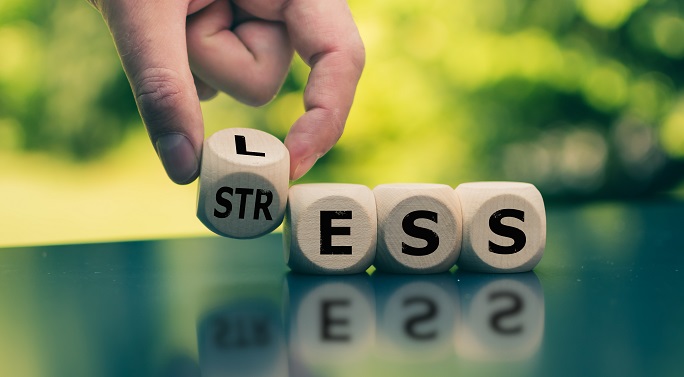These are stressful times; everyone has had to adjust, and we all have new things weighing on our minds each day. Many of us have had to step in as teachers for our children on top of managing our work responsibilities. That being said, stress is nothing new! Here are some common signs to help identify stress:
- Increased headaches
- Stomach or digestion problems
- Having trouble with focus, memory or staying on track
- Faster heart rate
- More irritability
- Tight jaw
- Interrupted sleep pattern
There are several areas in your life where you can invest time and attention to be the most successful in effectively managing stress and maintaining productivity. Try these 6 ways to manage stress effectively during COVID-19 and everyday.
1. Sleeping
High stress can make sleeping more difficult, but a good night’s rest can allow us to approach our day with less stress and more productivity. Most adults should get 7-8 hours of sleep per night! Five habits you can employ for the best sleep are:
- Routine: Try to follow sleep routines to get the most out of your night. It’s easy to fall into bad habits as you deal with this crisis, but try to avoid late nights binge-watching TV, no matter how tempting it is! This will only create a cycle of being sleep-deprived during the week and then crashing on the weekend, trying to catch up.
- Wind Down Time: In addition to getting sufficient sleep, try to make some time to calm down before bed. Sometimes a warm bath or shower can help, along with aromatherapy or other calming techniques. Take a few minutes of quiet to gather yourself and release the stresses of the day.
- Turn Off the Worry Light: Try to sort out your worries and concerns during the day BEFORE you start getting ready for bed. Acknowledge your worries and give yourself some time to sort through them but try not to take them to bed with you. If you find they are still swirling around in your mind as you get into bed, consider writing them down on a notepad at the bedside to “set them down”.
- Declutter: At the end of the workday, take a few minutes to clean up and declutter your workspace. Clutter is definitely a contributor to stress.
- Attitude of Gratitude: Making note of the things you are grateful for WILL help ease stress.
2. Eating
There are actually certain foods that can help you manage stress effectively. Some stress-relieving foods you may want to work into your diet include:
- Carbs: Carbohydrates help release serotonin, so consider adding complex carbohydrates.
- Oranges: Packed with vitamin C, oranges can work to reduce stress as well as boost the immune system.
- Leafy Greens: In addition to nutrients and antioxidants to make you feel healthier, leafy greens are also rich in folate to help boost serotonin production.
- Omega-3 Fatty Acids: These can help prevent surges in stress hormones, boost concentration and improve mood.
- Black Tea: Black tea might help you recover from a stressful event more quickly. A study found black tea helped lower levels of cortisol, a known stress hormone.
- Pistachios: Pistachios have been found to help lower cholesterol and can also help lessen the effects of stress.
- Raw Veggies: Eating raw vegetables can help ease stress simply by forcing you to relax a clenched jaw.
3. Exercising
Exercise can go a long way to help you manage stress effectively. Even though it will feel hard at first, the more you do it, the easier it will become! In fact, you may even find yourself depending on that physical exertion to help you stay calm and focused. Try to make time to get up and move during your workday. Some helpful tips for exercising while during shelter-in-place include:
- Music: Try listening to your favorite music and have a dance party with the kids.
- Strength Training: Try simple strength training exercises such as push-ups, sit-ups or lunges.
- Resistance Band: You could consider starting a competition with the family for fun!
- Virtual Training: Find workout videos online that you can do at home. You can find just the right one for what you like and what you need.
- Chores: Heavier household chores are another great way to burn calories and get moving! Try to spend at least 10 minutes at a time working on chores. Some examples include gardening, mowing, window washing, etc.
- Yoga: Yoga is another wonderful option as it can be done just about anywhere and does not require any special equipment – all you need is a mat and some comfortable clothes! Yoga helps teach meditation and a focus on breathing!
4. Breathing
Speaking of breathing, many times breathing can be the key to calming yourself after a stressful event. There are many different breathing techniques you can find with Google. One great one is the Flower and Candle technique. To practice this technique, breathe in through your nose like you’re smelling a flower and then exhale through your mouth like you’re blowing out a birthday candle. It’s easy and can be repeated until you feel calm.
5. Focusing
Remember that your focus should remain on the areas in your life where you have control. Some areas you can control are:
- Exposure: Consider limiting your exposure to COVID-19 news to only what you need.
- Routine: Try establishing a routine for your day, including getting dressed for your workday even though you are at home! You will have a more productive day if you have a routine. You will know what to expect and will feel more grounded.
- Separation: Think about making a separation from your home life and your designated workspace. Don’t eat meals at your computer and allow yourself to STEP AWAY at the end of the day.
- Connection: You can stay connected with others, even amid social distancing. Remember to call a friend, start a video call with your family, etc. Don’t forget to help your kids stay connected with friends and family as well.
6. Creating New Routines
How can we adjust to our new normal? Think about new ways to stay connected with your team and try to build in fun! Consider an incentive or a fun weekly theme to keep your work team engaged and happy. It’s also important to keep your team up to date by sending information regularly. If you can do so on a set schedule, it will help everyone feel like they have routine and order in their work lives. Remember, this crisis is far from over, so it’s crucial for us to learn how to adapt and manage stress effectively as we navigate this new world.
Click here to access additional COVID-19 Multifamily Training Resources
Read more like this from Edge2Learn

Contributed by:
Julie Doss
Director of Training and Customer Experience
Gene B Glick
Julie Doss is the Director of Training and Customer Experience for Gene B. Glick and oversees the education and training initiatives for the company. Julie is a recent graduate of the Customer Experience Executive Academy and is helping to lead her company in a customer service revolution. A graduate with majors in Speech Communications and Marketing from Ball State University, Julie has 20 years experience in the training arena and ten years at Glick and within the Multifamily Industry.
Edge2Learn is an eLearning company whose focus is the Property Management Industry and specializes in property management training and multifamily education. With over 30 years of experience and a commitment to increase industry excellence, we are passionate about engaging learners to maximize benefits for both companies and employees. Aligned with a well-respected industry leader, Ellis, Partners in Management Solutions, the Edge2Learn platform provides a turnkey solution for clearly identified needs and opportunities. We prepare learners to deliver a superior customer experience and also reduce corporate liability risks and overall employee turnover.



